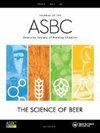感官描述分析加工条件对康普茶感官性状的影响
IF 1.8
4区 农林科学
Q4 BIOTECHNOLOGY & APPLIED MICROBIOLOGY
Journal of the American Society of Brewing Chemists
Pub Date : 2022-02-09
DOI:10.1080/03610470.2021.2022879
引用次数: 4
摘要
康普茶是一种发酵的加糖茶饮料,在过去十年中在美国越来越受欢迎。虽然经常加入水果和蔬菜来增强香气和风味,但无味的康普茶本身具有独特的感官属性,受多种因素的影响,包括初始茶叶类型,初始糖浓度和发酵温度。这些不同的因素是如何影响康普茶的最终香气和味道的,在科学文献中还没有得到充分的研究。在本研究中,采用因子设计,将加工处理,包括茶叶类型(黑色和绿色),糖浓度(63 g/L和94 g/L),发酵温度(21℃和25.5℃)相结合,生产实验康普茶(K = 8)。小组成员(N = 7)完成了对实验康普茶的完整感官描述性分析(DA)评估,其中他们定义了63种感官属性。MANOVA发现了43种不同的感官属性,这是由于茶叶类型、初始糖浓度和发酵温度的不同,尽管令人惊讶的是,茶、糖和温度并没有显著的相互作用。总体而言,在较低温度或较高糖发酵的茶更甜,更浓稠,并与水果相关的芳香有关;在较高温度和较少糖发酵的茶与发酵,植物和酵母的香气,起泡的口感以及酸味和苦味有关。令人惊讶的是,茶的种类在最终的康普茶味道中只起了微弱的作用。本文章由计算机程序翻译,如有差异,请以英文原文为准。
Processing Condition Effects on Sensory Profiles of Kombucha through Sensory Descriptive Analysis
Abstract Kombucha is a fermented and often sweetened tea beverage that has become increasingly popular in the U.S. in the last decade. While it is often infused with fruits and vegetables to enhance aroma and flavor, unflavored kombucha itself has distinctive sensory attributes influenced by multiple factors, including initial tea type, initial sugar concentration, and fermentation temperature. How these different factors affect the final aroma and flavor of kombucha has been underexplored in the scientific literature. In this study, processing treatments, including tea type (black and green), sugar concentration (63 g/L and 94 g/L), and fermentation temperature (21 °C and 25.5 °C) were combined in a factorial design to produce experimental kombucha (K = 8). Panelists (N = 7) completed a full sensory Descriptive Analysis (DA) evaluation of the experimental kombucha, in which they defined 63 sensory attributes. MANOVA identified 43 sensory attributes that differed among the samples due to tea type, initial sugar concentration, and fermentation temperature, although surprisingly tea, sugar, and temperature did not interact significantly. Overall, teas fermented at a lower temperature or with higher sugar were sweeter, thicker, and associated with fruit-related aromatics; teas fermented at a higher temperature and with less sugar were associated with fermented, vegetal, and yeasty aromas, fizzy mouthfeels, and sour and bitter tastes. Surprisingly, tea type played only a weak role in final kombucha flavor.
求助全文
通过发布文献求助,成功后即可免费获取论文全文。
去求助
来源期刊

Journal of the American Society of Brewing Chemists
工程技术-生物工程与应用微生物
CiteScore
4.00
自引率
20.00%
发文量
41
审稿时长
3 months
期刊介绍:
The Journal of the American Society of Brewing Chemists publishes scientific papers, review articles, and technical reports pertaining to the chemistry, microbiology, and technology of brewing and distilling, as well as the analytical techniques used in the malting, brewing, and distilling industries.
 求助内容:
求助内容: 应助结果提醒方式:
应助结果提醒方式:


